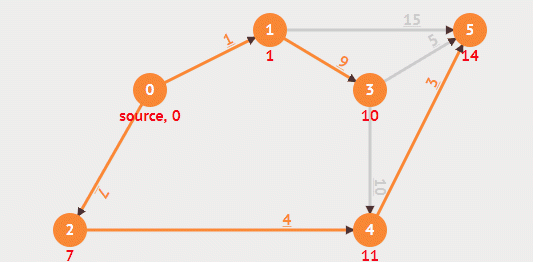前言
複習下尋路相關的東西,而且A star尋路在遊戲開發中應用挺多的,故記錄下。
正文
迪傑斯特拉算法
說起A*得先談談Dijkstra算法,它是在BFS基礎上的一種帶權值的兩點最短尋路貪心算法。
算法步驟
0.初始化圖,輸入起點,将所有點到起始點的距離設定為∞。
1.将起始點OriginNode記錄為已通路,并從OriginNode開始将周圍的點加入到待周遊清單中,更新到達這些點的距離,并将他們的父節點設定為起始點OriginNode。
2.如果待周遊清單不為空,則從清單中取出到達距離最小的點currentNode;反之則跳到第5步。
3.周遊currentNode鄰接的點neighbors:
1) 如果已通路過,則周遊其他點。
2) 如果鄰接的某點neighbor已經在待周遊清單中,則比較neighbor目前的距離distance(OriginNode,neighbor) 與 distance(OriginNode,currentNode) + distance(currentNode,neighbor), 如果後者更小,則将neighbor的距離值更新為該值并将父節點設定為currentNode。
3) 如果不在待周遊清單,則将neighbor放入待周遊清單,并則将neighbor的距離值更新為 distance(OriginNode,currentNode) + distance(currentNode,neighbor), 并将父節點設定為currentNode。
4.重複第2步
5.輸入終點,從終點開始回溯父節點,列印路徑。
動态過程

A* 尋路算法
A*的思路其實與Dijkstra一緻,相比較Dijkstra,A*引入了一個啟發公式來衡量消耗
其中 g(n) 代表從起始點到目前點的消耗,h(n) 代表終點到目前點的預估消耗(通常用曼哈頓距離或者歐拉距離衡量,這裡不贅述,參考)。
算法思路
/*
A*尋路算法
帶權值的BFS
每個點儲存達到該點的消耗F = G值(出發點到目前點的代價值) + H值(目标點到目前點的預估距離,常用曼哈頓距離或者歐拉距離)
維護着兩個清單,開放清單和關閉清單
邏輯:
初始化清單Close,Open,Path,将StartNode放入Open清單中
while(true)
{
從Open表中取得F值最小的節點CurrentNode.
從Open表中删除CurrentNode
将CurrentNode加入Close表中
if ( CurrentNode 是 目标點targetNode)
{
從CurrentNode點回溯直到起點并将所有回溯的節點加入Path表
列印Path表
return;
}
for (CurrentNode 的每一個鄰接點 neighbor)
{
if(neighbor 在 Close表中 || neighbor 不可通行)
{
continue;
}
if(neighbor 在 Open表中)
{
if( CurrentNode 到達neighbor的消耗costG + node的G值 < neighbor的G值)
{
更新neighbor的G值;
将neighbor的回溯節點fatherNode設定為CurrentNode;
}
}
else
{
更新neighbor的G值;
更新neighbor的H值;
将neighbor的回溯節點fatherNode設定為CurrentNode;
将neighbor放入Open清單;
}
}
}
*/
代碼:
AstarNode的定義實作.
Astar.h
#pragma once
#include <vector>
#include <math.h>
using std::vector;
class AstarNode
{
private:
int m_igValue;
int m_ihValue;
int m_ifValue;
AstarNode* m_father;
public:
int x;
int y;
bool isPass;
public:
void SetG(int iValue);
int GetG() const;
int GetH() const;
int GetF() const;
void CalculateH(const AstarNode* endNode);
void SetFather(AstarNode* node);
AstarNode* GetFather() const;
bool isInList(const vector<AstarNode*>& nodeList) const;
public:
AstarNode();
AstarNode(int x,int y);
AstarNode(const AstarNode& node);
~AstarNode();
AstarNode& operator=(const AstarNode& node);
}; Astar.cpp
#include "Astar.h"
AstarNode::AstarNode()
{
isPass = true;
m_igValue = 0;
m_ihValue = 0;
m_ifValue = 0;
m_father = nullptr;
}
AstarNode::AstarNode(int x,int y)
{
isPass = true;
m_igValue = 0;
m_ihValue = 0;
m_ifValue = 0;
m_father = nullptr;
this->x = x;
this->y = y;
}
AstarNode::AstarNode(const AstarNode& node)
{
isPass = node.isPass;
m_igValue = node.GetG();
m_ihValue = node.GetH();
m_ifValue = node.GetF();
m_father = node.GetFather();
this->x = node.x;
this->y = node.y;
}
AstarNode& AstarNode::operator=(const AstarNode& node)
{
isPass = node.isPass;
m_igValue = node.GetG();
m_ihValue = node.GetH();
m_ifValue = node.GetF();
m_father = node.GetFather();
this->x = node.x;
this->y = node.y;
return *this;
}
AstarNode::~AstarNode()
{
}
void AstarNode::SetG(int iValue)
{
m_igValue = iValue;
}
int AstarNode::GetG() const
{
return m_igValue;
}
int AstarNode::GetF() const
{
return m_igValue + m_ihValue;
}
int AstarNode::GetH() const
{
return m_ihValue;
}
void AstarNode::CalculateH(const AstarNode* endNode)
{
m_ihValue = abs(endNode->x - x) + abs(endNode->y - y);
}
void AstarNode::SetFather(AstarNode* node)
{
m_father = node;
}
AstarNode* AstarNode::GetFather() const
{
return m_father;
}
bool AstarNode::isInList(const vector<AstarNode*>& nodeList) const
{
for(auto iter = nodeList.begin();iter != nodeList.end();iter++)
{
if((*iter)->x == this->x && (*iter)->y == this->y)
return true;
}
return false;
} main.cpp
#include "Astar.cpp"
#include <algorithm>
using namespace std;
/*
'e' 終點
's' 起點
'#' 障礙物
'-' 可通行點
'o' 回溯路徑節點
*/
vector<vector<char>> graph = {
{'-', '-', '-', '-', '-', '-', '-'},
{'-', '-', 'e', '#', '-', '-', '-'},
{'-', '#', '#', '#', '#', '-', '-'},
{'-', '-', '-', '-', '#', '#', '-'},
{'-', '-', '#', '-', '#', '-', '-'},
{'-', '-', '-', '#', '-', '-', '-'},
{'-', '-', '-', '-', '-', '-', 's'},
};
void BuildGraph(vector<vector<AstarNode *>> &astarGraph, AstarNode &start, AstarNode &end)
{
for (int i = 0; i < astarGraph.size(); i++)
{
auto row = astarGraph[i];
for (int j = 0; j < row.size(); j++)
{
char mark = graph[i][j];
if (mark == 's')
{
start.x = i;
start.y = j;
start.SetG(0);
start.CalculateH(&end);
astarGraph[i][j] = &start;
}
else if (mark == 'e')
{
end.x = i;
end.y = j;
astarGraph[i][j] = &end;
}
else if (mark == '#')
{
astarGraph[i][j] = new AstarNode(i, j);
astarGraph[i][j]->isPass = false;
}
else
{
astarGraph[i][j] = new AstarNode(i, j);
}
}
}
}
void printGraph()
{
for (int i = 0; i < graph.size(); i++)
{
auto line = graph[i];
for (int j = 0; j < line.size(); j++)
{
cout << line[j] << " ";
}
cout << endl;
}
}
vector<AstarNode *>::iterator GetMinFNode(vector<AstarNode *> &openList)
{
auto tmp = openList.begin();
for (auto iter = openList.begin(); iter != openList.end(); iter++)
{
if ((*iter)->GetF() < (*tmp)->GetF())
{
tmp = iter;
}
}
return tmp;
}
inline int GetCost(int xDiff, int yDiff)
{
if (xDiff == 0 || yDiff == 0)
return 10;
return 14;
}
void SearchOneNode(AstarNode ¤tNode, AstarNode &neighbor, AstarNode &startNode, AstarNode &endNode, vector<AstarNode *> &openList, vector<AstarNode *> &closeList)
{
if (neighbor.isInList(closeList) || !neighbor.isPass)
return;
int gCost = GetCost(currentNode.x - neighbor.x, currentNode.y - neighbor.y);
if (neighbor.isInList(openList))
{
if (currentNode.GetG() + gCost < neighbor.GetG())
{
neighbor.SetG(currentNode.GetG() + gCost);
neighbor.SetFather(¤tNode);
}
}
else
{
neighbor.SetG(currentNode.GetG() + gCost);
neighbor.SetFather(¤tNode);
neighbor.CalculateH(&endNode);
openList.push_back(&neighbor);
}
}
void Astar()
{
vector<AstarNode *> OpenList;
vector<AstarNode *> CloseList;
vector<AstarNode *> Path;
size_t len = graph.size();
vector<vector<AstarNode *>> astarGraph(len, vector<AstarNode *>(len));
AstarNode startNode;
AstarNode endNode;
BuildGraph(astarGraph, startNode, endNode);
OpenList.push_back(&startNode);
while (!OpenList.empty())
{
auto it = GetMinFNode(OpenList);
AstarNode *currentNode = *it;
OpenList.erase(it);
CloseList.push_back(currentNode);
if (currentNode->x == endNode.x && currentNode->y == endNode.y)
{
while (currentNode->GetFather())
{
graph[currentNode->x][currentNode->y] = graph[currentNode->x][currentNode->y] == '-' ? 'o' : 'e';
Path.push_back(currentNode);
currentNode = currentNode->GetFather();
}
printGraph();
break;
}
int curX = currentNode->x;
int curY = currentNode->y;
int row = graph.size();
int column = row;
if (curX + 1 < row)
SearchOneNode(*currentNode, *astarGraph[curX + 1][curY], startNode, endNode, OpenList, CloseList);
if (curX - 1 >= 0)
SearchOneNode(*currentNode, *astarGraph[curX - 1][curY], startNode, endNode, OpenList, CloseList);
if (curY + 1 < column)
SearchOneNode(*currentNode, *astarGraph[curX][curY + 1], startNode, endNode, OpenList, CloseList);
if (curY - 1 >= 0)
SearchOneNode(*currentNode, *astarGraph[curX][curY - 1], startNode, endNode, OpenList, CloseList);
if (curX - 1 >= 0 && curY - 1 >= 0)
SearchOneNode(*currentNode, *astarGraph[curX - 1][curY - 1], startNode, endNode, OpenList, CloseList);
if (curX - 1 >= 0 && curY + 1 < column)
SearchOneNode(*currentNode, *astarGraph[curX - 1][curY + 1], startNode, endNode, OpenList, CloseList);
if (curX + 1 < row && curY - 1 >= 0)
SearchOneNode(*currentNode, *astarGraph[curX + 1][curY - 1], startNode, endNode, OpenList, CloseList);
if (curX + 1 < row && curY + 1 < row)
SearchOneNode(*currentNode, *astarGraph[curX + 1][curY + 1], startNode, endNode, OpenList, CloseList);
}
cout << endl;
}
int main()
{
auto start = chrono::steady_clock::now();
Astar();
auto end = chrono::steady_clock::now();
cout << chrono::duration<double, milli>(end - start).count() << " ms" << endl;
getchar();
}
參考資料
歐式距離與曼哈頓距離 作者:大魚-瓶邪
A* 搜尋算法(Python ) 作者: 漫步_9378
A* Pathfinding (需要梯子) 作者: Sebastian Lague
VisualGO 算法可視化